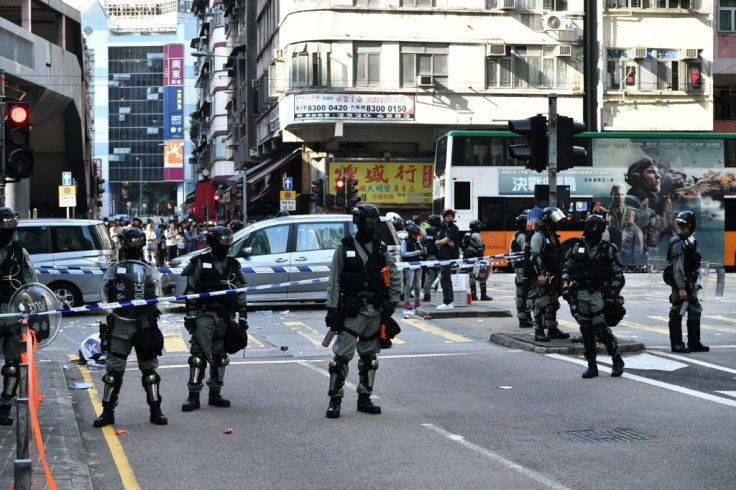Hong Kong Protest Update: Man In Critical Condition As Police Open Fire At Protesters

The Hong Kong Police Force shot a 21-year-old male Monday while opening fire at pro-democracy protesters. The shots left the man in critical condition. Earlier, two protesters were struck by bullets and were reported as conscious when they were transported to the hospital, according to a police spokesperson.
The events, that occurred at about 7:30 a.m. local time (6:30 p.m. EST, Sunday) outside the Sai Wan Ho Mass Transit Railway station, capped off the latest weekend of violence in the troubled city.
On Friday, at a separate location, a 22-year-old protester died from his injuries after clashing with police and falling from a building. The man’s death was the latest spark for several weekend protests that included flash-mob demonstrations and a rally on Sunday near government headquarters.
Three pro-democracy lawmakers were arrested Saturday, with government officials warning that others might face the same fate if the protests continued. The warning did nothing to stem the rioting as protesters blocked roads and vandalized shopping malls across Hong Kong’s New Territories and Kowloon peninsula.
The latest protests are a far cry from the relatively peaceful demonstrations in early June against an extradition bill. The bill, some feared, would have allowed authorities from the mainland to enter Hong Kong and take people suspected of anti-Chinese sentiments back to China where they could face trumped-up charges or be subjected to human rights abuses under the Communist regime.
The pro-Chinese government in Hong Kong, led by Chief Executive Carrie Lam, gave in to that demand and formally withdrew the extradition bill in early September. By this time the protesters were emboldened, and their leaders saddled Lam’s government with four other demands.
Among the added demands was a call for “universal suffrage” to obtain a more representative democracy. The leaders are currently elected by a small, mostly pro-Beijing group of elites probably hand-picked by the mainland. Hong Kong is scheduled to hold local elections in November.
The worry of most of Hong Kong’s 7.5 million citizens is losing some legal and economic freedoms that they enjoy under the “one country, two systems” principle. In 2047 Hong Kong is scheduled to lose its status as a special autonomous region along with the freedoms it enjoys under its mini-constitution, known as the Basic Law.
China may see the current unrest as a path to an earlier re-unification. Beijing has made it clear it wants Hong Kong and Taiwan to be reunified with the Chinese Communist Party under a “one country-one system”. This will certainly not sit well with a populace that has enjoyed some degree of freedom.
© Copyright IBTimes 2025. All rights reserved.





















